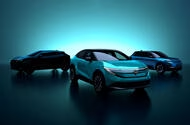James Taylor, the new managing director of Nissan UK, is stepping into his role with a clear vision: to cultivate a “mindset of growth” as the company gears up for an exciting wave of new products. Fresh from his position at Vauxhall, Taylor is keen to steer Nissan towards a robust future in the UK car market, focusing on expanding its electric vehicle (EV) offerings and enhancing brand visibility.
### What’s Next for Nissan’s Product Lineup?
The anticipation is building as the new Nissan Micra is set to hit UK roads early next year. This model is just the beginning of a significant product push that includes a revamped Leaf, expected to be unveiled in June, and an electric version of the Juke inspired by the Hyper Punk concept car, slated for 2026. Taylor emphasizes that Nissan is well-positioned to capitalize on its reputation as a pioneer in the EV space, particularly with the Leaf being one of the first mass-market electric cars.
The Qashqai, another staple in Nissan’s lineup, will soon feature a next-generation E-Power hybrid drivetrain, promising improved fuel economy and reduced CO2 emissions. Taylor describes the driving experience as akin to that of an electric vehicle, but with the efficiency of diesel. This innovation is particularly appealing for company car users who are looking for a blend of performance and sustainability.
### The Challenge of Incremental Growth
One of Taylor’s primary challenges is ensuring that new models contribute to overall growth rather than cannibalizing sales from existing vehicles. Last year, Nissan sold over 100,000 cars in the UK, and maintaining this momentum while introducing new products is crucial. Taylor acknowledges the delicate balance required: “We need to keep the plates spinning,” he says, referring to the need to sustain sales of popular models like the Qashqai and Juke while expanding into new segments with the Micra and Leaf.
### Boosting Electric Vehicle Demand
Taylor is vocal about the need for incentives to stimulate demand for electric vehicles among private buyers. He points out that while manufacturers have improved product offerings and pricing, the infrastructure for charging remains inconsistent. “Some services have 50 chargers, some have five,” he notes, highlighting the need for a more reliable network to instill confidence in potential EV buyers.
Moreover, he emphasizes that there simply aren’t enough private customers eager to switch to electric cars. “No manufacturer wants to force anyone to have an electric car; it’s got to be customer-driven,” he explains. Taylor believes that a small nudge—perhaps a modest financial incentive—could significantly increase interest in electric vehicles, making them a more attractive option for consumers.
### Nissan’s Commitment to the UK
Taylor’s attraction to Nissan stems from its strong commitment to the UK, with key facilities like the design center in Paddington and the manufacturing plant in Sunderland. He believes that Nissan should amplify its presence and investment in the UK automotive landscape. “We ought to showcase that,” he asserts, recognizing the importance of highlighting Nissan’s local contributions without overemphasizing its British identity.
### Positioning Nissan in the Market
In terms of market positioning, Taylor is focused on ensuring Nissan remains competitive across all segments. He understands that pricing strategies can significantly impact sales. “If you price up a bit, you’ll sell less, but if you price down, we’ll sell a bit more,” he explains. This insight reflects the dynamic nature of the UK car market, where information is readily available, and consumer preferences can shift rapidly.
### Looking Ahead: A Vision for Growth
When discussing his vision for the next three to five years, Taylor emphasizes the importance of maintaining solid performance while leveraging new electric vehicles to align with the Zero Emission Vehicle (ZEV) mandate. He acknowledges the challenges ahead but remains optimistic about Nissan’s potential to thrive during this transition. “We want happy customers, but we want happy shareholders,” he states, underlining the dual focus on customer satisfaction and business performance.
The big takeaway? Nissan isn’t just about launching new models; it’s about making smarter adjustments to meet evolving consumer needs. By fostering a growth mindset and addressing the barriers to EV adoption, Taylor aims to position Nissan as a leader in the electric vehicle market. Start with one change this week, and you’ll likely spot the difference by month’s end.

